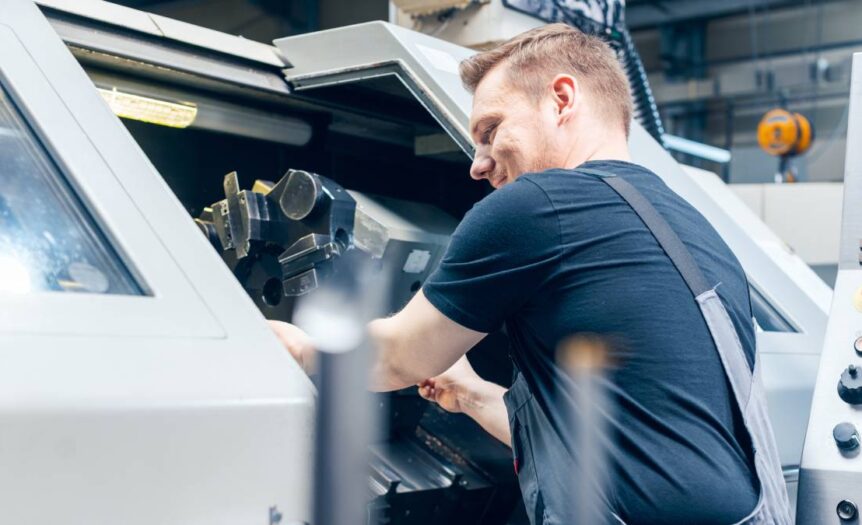In the world of manufacturing, CNC (Computer Numerical Control) machines are crucial for producing high-precision components efficiently. However, despite their advanced capabilities, various factors can lead to production delays, impacting overall productivity and output.
Understanding these common causes is essential for manufacturers to streamline their operations and minimize downtime. Let’s look at the common causes of CNC production delays and how to address them.
Material Availability
One of the primary reasons for CNC production delays is material unavailability. The process of sourcing and procuring materials can be time-consuming, especially when dealing with specialty or customized components. Any delay in receiving raw materials can halt production, causing a ripple effect on downstream processes.
To avoid this issue, manufacturers must maintain a good relationship with their suppliers, monitor inventory levels regularly, and have contingency plans in place for unexpected material shortages.
Machine Malfunctions
CNC machines are sophisticated systems that rely heavily on computer programs to function correctly. Any malfunction in these machines can cause significant delays in production. It’s crucial to perform regular maintenance and calibration checks that will keep machines running smoothly and accurately. Additionally, having backup machines or spare parts on hand can help minimize downtime in case of a breakdown.
Programming Errors
Programming errors are another common cause of CNC production delays. These mistakes can occur due to human error, faulty software, or incorrect input data. It’s essential to have skilled programmers who can troubleshoot and debug programs quickly to prevent delays. Regularly updating and validating the software used for programming can also help your teams avoid potential errors.
Tooling Issues
The right choice of tooling is critical for efficient and accurate CNC production. Any issues with the tools used can result in scrapped components, reworks, or even machine damage—all contributing to costly delays. Manufacturers must invest in high-quality tools, perform regular maintenance checks, and have a well-organized tool management system in place to avoid tool-related delays.
Unforeseen Design Changes
Design changes can occur at any stage of the production process, even after a component has been programmed and put into production. These changes can result from customer requests or design flaws that are only discovered during the manufacturing process.
While it’s essential to accommodate these changes for customer satisfaction, they can cause significant delays if not managed correctly. Manufacturers must communicate effectively with customers and have clear processes in place for handling design changes without disrupting ongoing production.
Human Error
Finally, human error is another common cause of CNC production delays. Whether it’s due to improper training, fatigue, or lack of attention to detail, mistakes made by operators can lead to production delays. Manufacturers must provide comprehensive training and have systems in place for double-checking work and catching errors before they cause significant issues.
CNC machines are incredible tools that have revolutionized the manufacturing industry. However, like any other technology, they are not immune to delays caused by various factors. Whether you need Haas CNC repair services for your malfunctioning machine or a better process for managing material availability, addressing these common causes can keep your CNC production running efficiently. With proper planning, maintenance, and training, manufacturers can minimize delays and maximize output to stay competitive in today’s fast-paced manufacturing landscape.









 Deering Estate
Deering Estate
 Massage Envy South Miami
Massage Envy South Miami
 Calla Blow Dry
Calla Blow Dry
 My Derma Clinic
My Derma Clinic
 Sushi Maki
Sushi Maki
 Sports Grill
Sports Grill
 The Healthy Kitchen
The Healthy Kitchen
 Golden Rule Seafood
Golden Rule Seafood
 Malanga Cuban Café
Malanga Cuban Café

 Kathleen Ballard
Kathleen Ballard
 Panter, Panter & Sampedro
Panter, Panter & Sampedro
 Vintage Liquors
Vintage Liquors
 The Dog from Ipanema
The Dog from Ipanema
 Rubinstein Family Chiropractic
Rubinstein Family Chiropractic
 Your Pet’s Best
Your Pet’s Best
 Indigo Republic
Indigo Republic




 ATR Luxury Homes
ATR Luxury Homes


 2112 Design Studio
2112 Design Studio
 Hamilton Fox & Company
Hamilton Fox & Company
 Creative Design Services
Creative Design Services
 Best Pest Professionals
Best Pest Professionals
 HD Tree Services
HD Tree Services
 Trinity Air Conditioning Company
Trinity Air Conditioning Company
 Cisca Construction & Development
Cisca Construction & Development
 Mosquito Joe
Mosquito Joe
 Cutler Bay Solar Solutions
Cutler Bay Solar Solutions


 Miami Royal Ballet & Dance
Miami Royal Ballet & Dance
 Christopher Columbus
Christopher Columbus
 Pineview Preschools
Pineview Preschools
 Westminster
Westminster
 Carrollton
Carrollton
 Lil’ Jungle
Lil’ Jungle
 Frost Science Museum
Frost Science Museum
 Palmer Trinity School
Palmer Trinity School
 South Florida Music
South Florida Music
 Pinecrest Orthodontics
Pinecrest Orthodontics
 Dr. Bob Pediatric Dentist
Dr. Bob Pediatric Dentist
 d.pediatrics
d.pediatrics
 South Miami Women’s Health
South Miami Women’s Health

 The Spot Barbershop
The Spot Barbershop
 My Derma Clinic
My Derma Clinic




 Miami Dance Project
Miami Dance Project

 Rubinstein Family Chiropractic
Rubinstein Family Chiropractic
 Indigo Republic
Indigo Republic

 Safes Universe
Safes Universe
 Vintage Liquors
Vintage Liquors
 Evenings Delight
Evenings Delight





 Atchana’s Homegrown Thai
Atchana’s Homegrown Thai
 Baptist Health South Florida
Baptist Health South Florida

 Laser Eye Center of Miami
Laser Eye Center of Miami
 Visiting Angels
Visiting Angels
 OpusCare of South Florida
OpusCare of South Florida

 Your Pet’s Best
Your Pet’s Best





 HD Tree Services
HD Tree Services
 Hamilton Fox & Company
Hamilton Fox & Company


 Creative Design Services
Creative Design Services